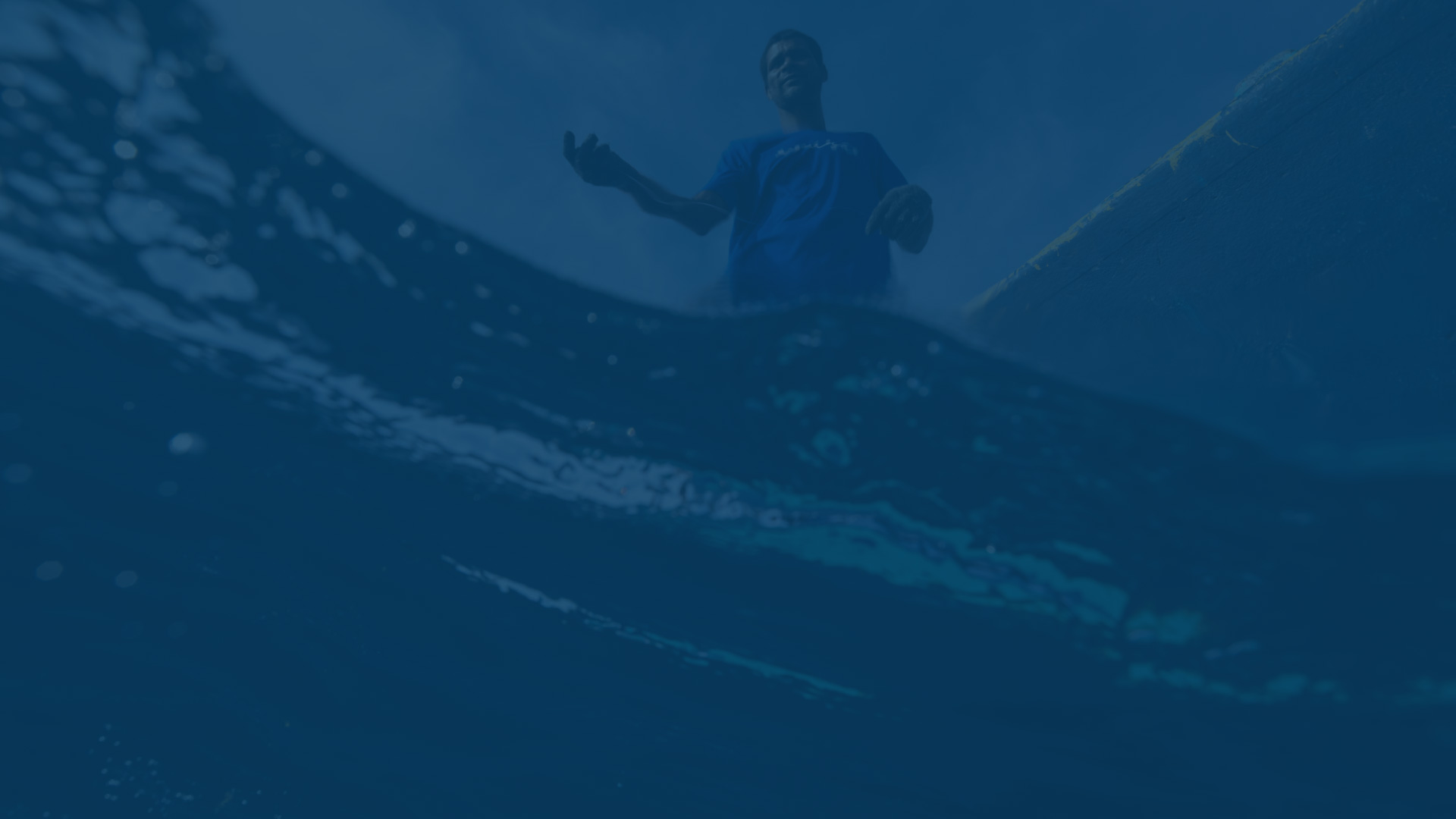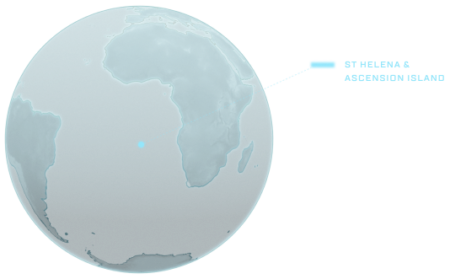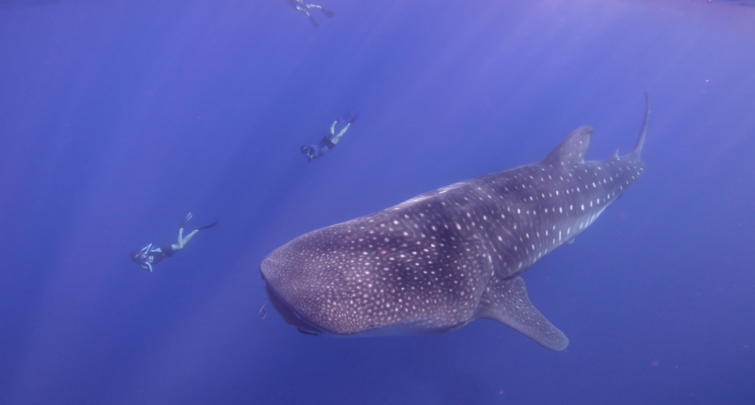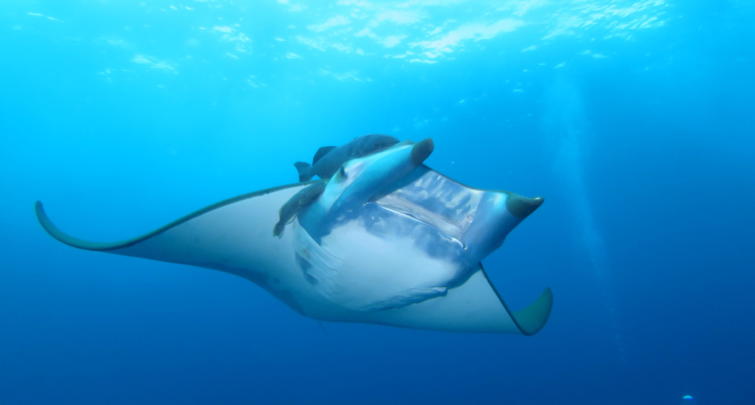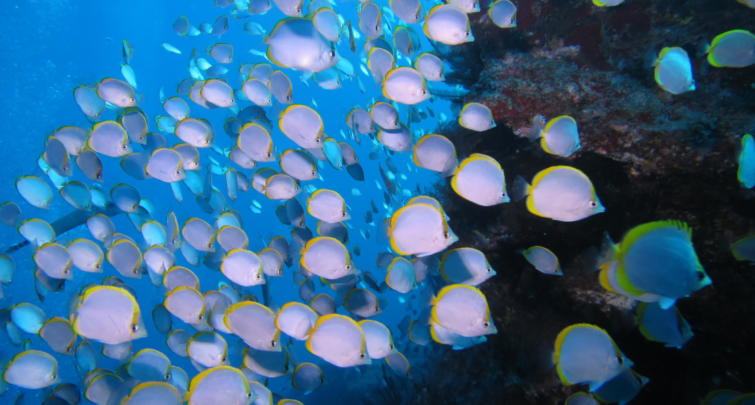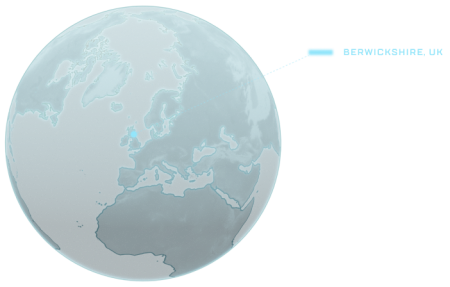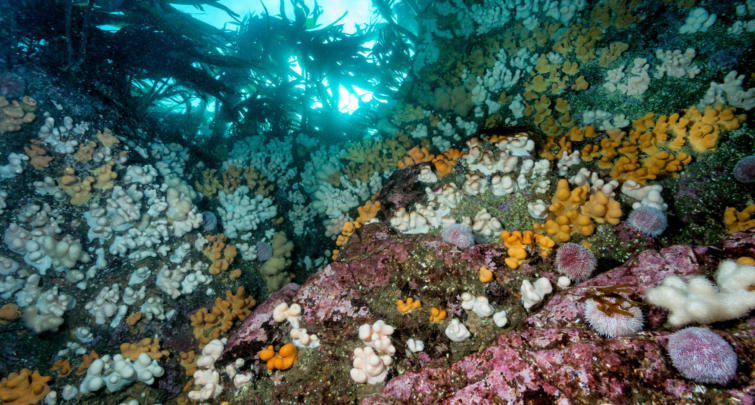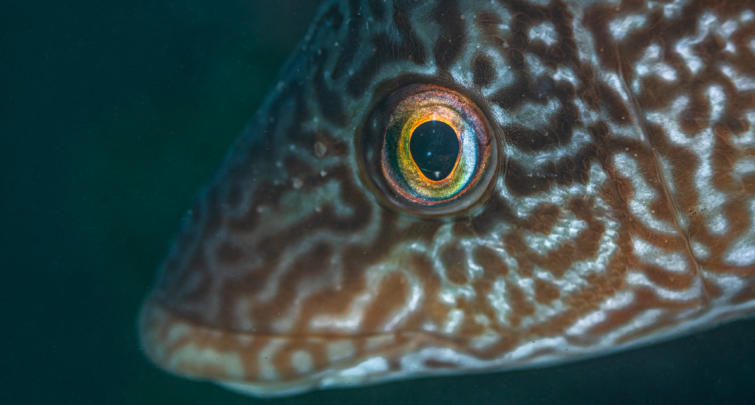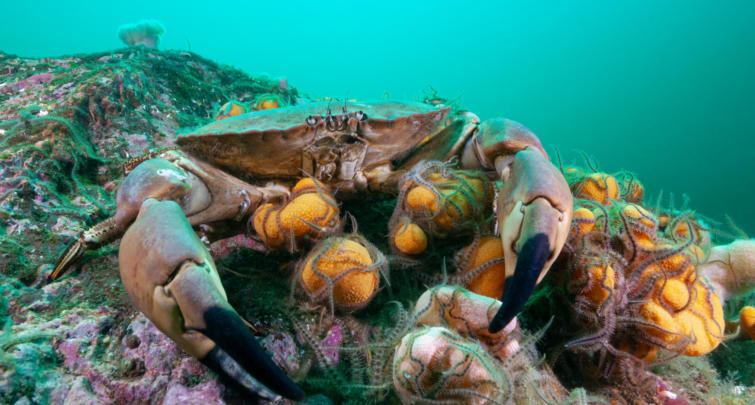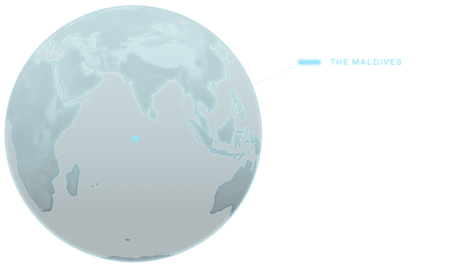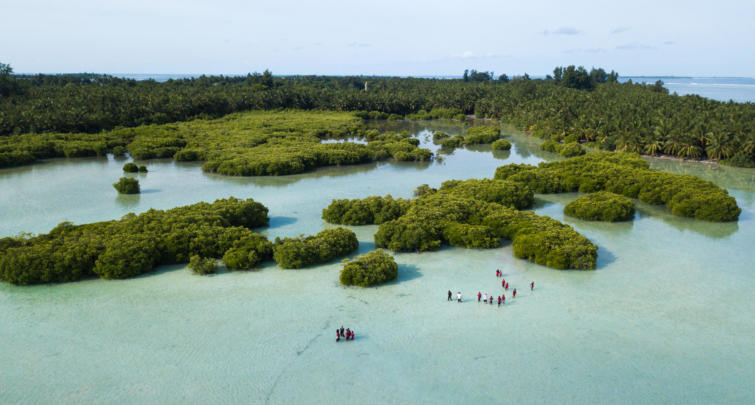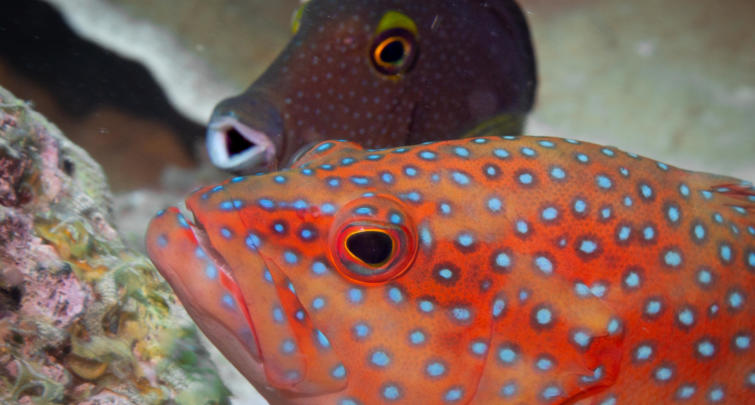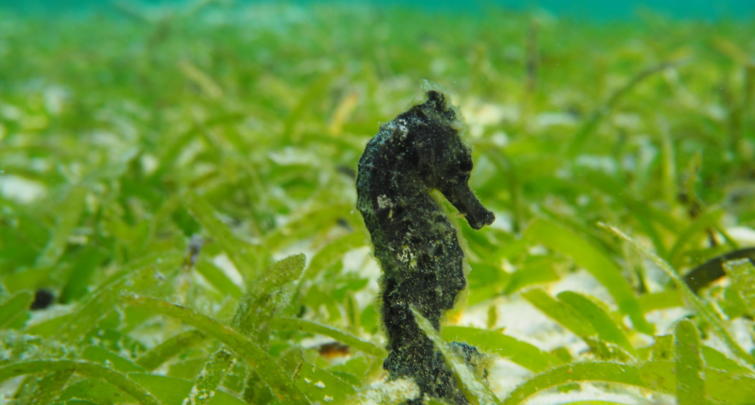About Blue Marine Foundation
Blue Marine Foundation is a charity dedicated to restoring the ocean to health by addressing overfishing, one of the world’s biggest environmental problems.
To achieve a healthy ocean forever, for everyone.
We want to see at least 30% of the world’s ocean under effective protection by 2030 and the other 70% managed in a responsible way.
Since 2010, Blue Marine has achieved a huge amount for ocean conservation. Here are some of our achievements:
2021: The Scottish government announced an emergency MPA to protect the critically endangered flapper-skate egg site near the Isle of Skye after pressure from a campaign supported by Blue Marine.
2021: A byelaw, supported by Sir David Attenborough and Blue Marine through the Help Our Kelp coalition, protected 300 square kilometres of seabed off the Sussex coast from damaging trawl fishing.
2021: Blue Marine placed thousands of oysters into the sea to create the Solent’s first oyster restoration reef in Langstone Harbour.
2021: Based on evidence gathered by Blue Marine and our partners, the Maldivian Government designated six new protected areas, encompassing coral reefs, mangroves and seagrass meadows.
2020: Following a threat of legal action from Blue Marine, the UK Government brought forward a consultation on the future of fishing in offshore marine protected areas, starting with the Dogger Bank.
2020: The Tristan da Cunha community designated 687,000 square kilometres of their territorial waters as a no-take zone. Led by RSPB and National Geographic Pristine Seas, Blue Marine supported the project in partnership with Becht Family Charitable Trust.
2019: With support from Blue Marine, 100 per cent of the waters around Ascension Island were designated a marine reserve, creating the largest fully protected marine reserve in the Atlantic, an area nearly the size of France.
2019: Following Blue Marine’s #StopElectricFishing campaign, undertaken in collaboration with Bloom Association, the European Parliament’s Committee on Fisheries voted to ban electric pulse fishing in EU waters.
2018: Azerbaijan declared the first MPA in the Caspian Sea, the largest inland body of water on the planet. The new MPA will seek to protect six significant marine species on the brink of extinction.
2018: The UK Government announced a target of 30 per cent of ocean protected by 2030, aligning with Blue Marine’s long-term strategy.
2017-2018: Blue Marine spearheaded a social media campaign to encourage the public to tweet and email their MPs, resulting in 285 MPs from eight political parties signing up to the Blue Belt Charter by the end of 2018.
2017: In 2017, Blue Marine, as part of the Great British Oceans coalition, secured an even stronger manifesto commitment from the UK Government ahead of the June 2017 election to protect over four million square kilometres of ocean around the UK overseas territories.
2016: In 2016, Blue Marine secured the creation of a no-take zone in 52.6 per cent of Ascension Island’s waters.
2015: In 2015, the Great British Oceans coalition, of which Blue Marine is an active part, secured a UK government commitment to create the world’s largest marine reserve around Pitcairn in the Pacific.
2015: In 2015, Blue Marine and the Great British Oceans coalition secured a government manifesto commitment to create a “Blue Belt” around all 14 UK overseas territories, hailed as “the greatest conservation commitment by any government ever”.
2012: In 2012, Blue Marine partnered with the government of Belize and the Bertarelli Foundation to protect the Turneffe Atoll in Belize, an area rich in biodiversity and CO2 absorbing mangroves.
2010: In 2010, Blue Marine, with support from the Bertarelli Foundation brokered a deal to enable the creation of what was then the largest marine protected area (MPA) in the world around Chagos in the Indian Ocean
The climate is changing and we must drastically cut our greenhouse gas emissions and stop using fossil fuels. Climate change is already impacting the ocean. Choose a journey and explore how maintaining ocean health is essential for both people and planet in a changing climate.
There are lots of ways you can get involved with Blue Marine and make a difference in protecting the future of our ocean and climate.
Share this experience
Share this website with your friends and family, and follow us to learn more.
Start a conversation
Inspire others around you to learn more about what’s happening to our ocean and climate. We need to work together to achieve long-lasting change.
Sign a petition, engage with decision-makers
Help to highlight our ocean’s issues to governments and evoke positive change. Use the links under sustainable fishing, marine protected areas and blue carbon habitats to help highlight problems to governments and demand lasting change and improvements. We will regularly update these sections with important campaigns you can help support. For a summary of these links, plus extras, visit our Education Linktree!
For school students and those who need help contacting their local decision-makers, download our free guide to get started! Take Action: Dear Minister…
Monitor a wildlife camera
Help with species reporting and identification by watching a live stream wildlife camera.
- Check out Explore Livecams to see coral reefs, manatees, orcas, seals and more!
- The Wildlife Trusts webcams bring you stunning views of dolphins, puffins and ospreys from around the UK.
Berwickshire Ocean Observatory – coming soon…
Ask Blue Marine
Submit your questions to the Blue Marine team and help us improve the way we communicate conservation and our work.
Join a citizen science project
Get involved either in the field or at your desk. To help scientists record data from the comfort of your own home, visit Zooniverse for a range of citizen science programmes. We recommend OceanEyes, SpyFish, Manatee Chat and Penguin Watch!
If you want to get outdoors and help scientists to understand marine and coastal habitats, you could take part in the following citizen science initiatives:
- The Great Eggcase Hunt
- The Big Seaweed Search
- Coastal BioBlitz
- ShoreSearch
- The Great Reef Census
- Or visit your countries national biodiversity database (e.g. for the UK)
Stay informed
Keep up to date with the latest ocean news and environmental research:
- Mongabay (or Mongabay Kids)
- Science Journal for Kids and Teens
- TED-Ed – Lessons Worth Sharing
What can you do to protect marine life and end overfishing?
Actions
Overfishing poses a huge threat to our oceans. We define a sustainable fishery as one that allows for the regeneration of habitats and fish stocks including non-target species, that extracts fewer fish than are replenished naturally, and that does so in a non-destructive manner.
- Support the protection of 30% of the ocean by 2030 (30X30) through the Campaign for Nature
- Protect critical marine habitats and wildlife from bottom-trawl and dredge fishing in Scotland. Join the Our Seas campaign.
- If you eat seafood, ensure it is caught sustainably – avoid threatened species and those caught by dredgers and bottom-trawlers. You can ask your fishmonger or try this guide: MCS Good Fish Guide
- Learn more about sustainable fisheries. The Lyme Bay fishery model was devised collaboratively by fishermen, scientists and conservationists to reduce environmental damage and improve sustainable livelihoods in the fishing industry. Watch the film!
- Demand more action to stop illegal fishing and put an end to damaging subsidies for good!
What can you do to help protect the ocean?
Actions
- Support the protection of 30% of the ocean by 2030 (30X30) through the Campaign for Nature
- Put your hand up and protect our deep ocean from deep-sea mining – Sign the petition
- Discover the world’s MPAs and try to find the one closest to you! Protected Planet
What can you do to help protect and restore blue carbon habitats?
Actions
- Planning a day out on the boat? Use the Green Blue Guide to make sure you don’t drop your anchor over seagrass meadows.
- Support restoration initiatives in your area. Check out Project Seagrass or Wild Oysters!
- Keep an eye out for coastal developments within your area that may damage blue carbon habitats. Contact your local authorities who are responsible for protecting coastal habitats. For school students and those who need help contacting their local decision-makers, download our free guide to get started! Take Action: Dear Minister…
- Going for a wetland walk? Stick to the paths and safeguard precious salt marsh!
Blue Marine defines a sustainable fishery as one that allows for the regeneration of habitats and fish stocks including non-target species, that extracts fewer fish than are replenished naturally, and that does so in a non-destructive manner.
Berwickshire
Close to the Berwickshire shore, kelp forests grow thick and wild while, in deeper waters, soft corals and anemones carpet rocky reefs. Converging cold and warm water currents provide an unusual diversity of marine life. Cup corals share space alongside Arctic wolffish and pods of bottlenose dolphins, giving scientists an opportunity to monitor the effects of climate change within a marine protected area.
Just like nature reserves and protected areas on land, marine protected areas (MPAs) protect areas of ocean and seas. Did you know that on average, species richness is 21% higher within marine reserves than unprotected areas? Unfortunately, only 2.7% of the world’s ocean is highly protected.
St Helena (UK Overseas Territory)
St Helena’s waters were designated an IUCN Category VI marine protected area in 2016, allowing only sustainable use. Blue Marine is working alongside the community to ensure that the area – all 444,916 square kilometres – is indeed protected and that the local islanders benefit from their exceptional natural resource.
Marine habitats can absorb vast amounts of carbon, typically more than forests found on land! Mangrove forests, tidal marshes and seagrass meadows make up these underwater forests, which are also known as blue carbon habitats. They play a vital role in mitigating climate change and provide homes for thousands for species.
The Maldives
The Maldives is at the forefront of climate change. It is particularly impacted by coral reef bleaching and sea-level rise (the country is 99% water). Blue Marine is working to restore coral reefs and climate resilient ecosystems for the benefit of nature and the people that depend on them.
Blue Marine has developed classroom resources which link to primary and secondary science curriculums in the UK, USA, Canada and Australia.
Resources for educators
Journey to a healthy ocean – Facilitation Guide for Teachers and Parents
Supporting PowerPoint Decks:
Student Workbooks
Primary School Students – Ocean Champion Guide 8+
Secondary School Students – Student Activity Journal 12+
Wild Oysters Classroom Resources
Download the Wild Oysters educational materials to learn about the superheroes of the sea!
Feedback surveys
We would love to get your feedback on these resources!
Do you have ten minutes to fill out a short questionnaire? This will help us to improve the development of future educational resources.
Blue Marine has created free educational resources about the ocean and marine conservation. You can download these here:
- Brush up on your knowledge using this Fishy Facts sheet
- Then take Grumpy Grandpa Grouper’s quiz
- Get Drastic with Plastic – worksheet
- Find Blue Marine’s Projects – geography worksheet
- Oyster Restoration – maths worksheet
Here are some useful links to help you learn further about our oceans.
Links to learn more about Sustainable Fishing
- Read this article (Science Journal for Kids and Teens) to discover how we can reduce the impact of fishing.
- Watch this video (TED-Ed) to meet the Bluefin Tuna, the toughest fish in the sea.
- Listen to David Attenborough as he explains what we need to do to stop overfishing.
- Will the ocean ever run out of fish? Watch this video to find out.
- Visit Global Fishing Watch to track fishing vessels worldwide.
- Play ‘Chief of the Reef’ to find out how to preserve fisheries in the Maldives (Maldives Resilient Reefs).
- Read this article (Science Journal for Kids and Teens) to explore how fisheries and MPAs can work together.
Links to learn more about Marine Protected Areas
- Read these articles about MPA coverage (Science Journal for Kids and Teens) and how to use MPAs to protect our oceans (Kids Frontiers).
- Install the free Secrets of St. Helena app on your phone or tablet – just visit the Apple or Google Play Store! (Planetari).
- Create an MPA from your classroom (National Geographic).
- Discover where MPAs are located across our oceans (Protected Planet).
- Visit our ocean’s MPAs and find out why we need more.
- Learn about how MPAs are categorised by the IUCN.
Links to learn more about Blue Carbon Habitats
- Explore a GIS story map on oceanic blue carbon.
- Read this article about how carbon cycles through the oceans (Science Journal for Kids and Teens).
- Watch this video to meet the sharks that hunt in forests (TED-Ed).
- Read this article about why coastal forests are important to coral reefs (Mongabay Kids).
- Read this news update to discover how dugongs and turtles help seagrass to grow (Mongabay Kids).
- Visit the Blue Carbon Initiative website to learn about some current conservation, restoration, science and policy activities.
- Read Blue Marine’s Blue Carbon Report.
Other Useful Links
- Shout Out for Sharks with this Bite Back education pack
- Track turtles, manta rays and sharks as they travel through the global oceans using the Reef Tracks – Marine Life Tracker.
- Find out more fun facts about your favourite marine species:
- Read this article to see how rewilding the sea protects us against storms (Science Journal for Kids and Teens).
Thinking about a career in marine conservation?
Job searching
Sign up to SEVENSEAS Media and WiseOceans newsletters for updates on vacancies, or take a look at Ocean Scholar’s videos on Youtube.
Ask Blue Marine
Ask Blue Marine a question about ocean careers.
There are a huge range of ocean career paths, no matter your background, age or experience. Ocean science and conservation impacts every one of us, so here at Blue Marine we are developing an inclusive and representative internship programme – coming soon!
